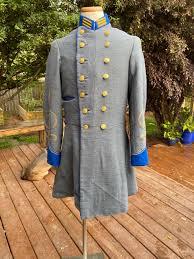The Civil War frock coat is an iconic piece of military attire that evokes the era of the American Civil War (1861–1865). This coat was a standard uniform for soldiers and officers of both the Union and Confederate armies, reflecting the fashion, Civil War Frock Coat of the time. In this article, we explore the history, design, variations, and enduring legacy of the Civil War frock coat.
Introduction to the Civil War Frock Coat
The frock coat was a long, tailored garment that extended below the waist, commonly worn during the 19th century. It became a distinctive element of military uniforms during the Civil War, signifying rank and allegiance while providing functionality on the battlefield.
Key Features:
- Structured Design: Tailored to fit snugly, offering a professional appearance.
- Durability: Made from sturdy fabrics like wool to withstand harsh conditions.
- Versatility: Adapted for both combat and formal settings.
Historical Background
The American Civil War marked a turning point in military fashion, with uniforms serving as both practical attire and a symbol of identity. The frock coat played a critical role in distinguishing officers and soldiers, with variations reflecting the different ranks, units, and sides of the conflict.
1. Pre-Civil War Roots
The frock coat originated in European fashion, later adopted by American military forces in the 19th century. Its structured, full-length design made it ideal for both ceremonial and combat purposes.
2. Role in Civil War Uniforms
- Union Army: The blue frock coat became synonymous with Union soldiers, often adorned with brass buttons and insignia.
- Confederate Army: Gray or butternut-colored frock coats were standard, reflecting the South's limited resources.
Design and Features of the Frock Coat
The frock coat was meticulously designed to balance style, comfort, and utility.
1. Materials
- Wool: Primary fabric for warmth and durability.
- Cotton Lining: Provided additional comfort and breathability.
2. Construction
- Double-Breasted or Single-Breasted: Determined by rank and role.
- Skirted Design: Extended below the waist for a formal appearance.
- High Collar: Often standing or turned down, featuring rank insignia.
3. Details
- Buttons: Typically made of brass or tin, engraved with unit emblems.
- Epaulettes: Worn by officers to denote rank.
- Piping and Trim: Added decorative elements, often in branch-specific colors.
Variations of the Civil War Frock Coat
Different styles of frock coats existed to accommodate the diverse roles within the military.
1. Officer's Frock Coat
- Made with fine materials and detailed embroidery.
- Featured gold or silver trim to signify rank.
2. Listed Men's Frock Coat
- Simpler design with minimal ornaments.
- Focused on practicality for everyday wear.
3. Specialty Units
- Cavalry and artillery units often wore frock coats with distinct colors and patterns.
- Medical personnel had unique insignia on their frock coats for easy identification.
Significance of the Frock Coat
1. Symbol of Rank and Identity
The frock coat clearly identified soldiers' ranks and affiliations, fostering unity and discipline within units.
2. Functional Benefits
- Protection: Provided insulation in harsh weather.
- Storage: Multiple pockets allowed soldiers to carry essential items.
3. Cultural Legacy
The frock coat has become a symbol of the Civil War era, appearing in reenactments, museums, and media representations.
Caring for Civil War Frock Coats
1. Preservation of Originals
- Store in a cool, dry environment to prevent deterioration.
- Use acid-free tissue paper for support.
2. Replicas for Reenactments
Modern replicas are crafted to mimic the original designs while using updated materials for comfort and affordability.
Modern Usage and Legacy
1. Historical Reenactments
Frock coats are a staple in Civil War reenactments, helping participants recreate the era authentically.
2. Museums and Exhibits
Original frock coats are displayed in museums as a testament to their historical and cultural importance.
3. Fashion Influence
The frock coat's tailored design continues to inspire modern formalwear.
Conclusion
The Civil War frock coat stands as a timeless artifact of American history, representing the bravery, sacrifice, and complexity of the Civil War era. Its elegant design and functional utility made it a critical part of military uniforms, while its variations reflected the diversity within the Union and Confederate forces. Today, the frock coat lasts as a symbol of 19th-century military heritage, appreciated for its historical significance and enduring style. Whether preserved in museums or worn during reenactments, the Civil War frock coat remains a poignant reminder of a pivotal chapter in American history.
